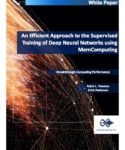Sunnyvale, Calif. – May 9, 2023 – Researchers from NTT Research, Inc., the Massachusetts Institute of Technology (MIT) and several optical computing companies have demonstrated an approach to optically driven deep neural networks (DNN) that they say resolves the memory-access bottleneck in resource-constrained edge devices, enabling significant energy usage and latency reductions. Conceived by NTT […]
At SC20: XTREME-D Launches AI Gateway on AXXE-L
Palo Alto, CA, Nov. 16, 2020 – HPC Cloud company XTREME-D today announced AI Gateway, which simplifies the process of building a deep neural network (DNN). The product is currently available in Japan and will be integrated into XTREME-D’s flagship product, AXXE-L by XTREME-D, and be available worldwide next quarter (for more information, see this […]
Samsung, IBM, Tencent Lead AI Patent Race, Europe Lags
Three companies – Samsung, IBM and Tencent – dominate the global AI patent race over the past 10 years, while fierce competition between the U.S, and China overshadows other countries and regions, including the EU. These are the key findings of OxFirst, a specialist in IP law and economics (and spin out of Oxford University), […]
Whitepaper: Accelerate Training of Deep Neural Networks with MemComputing
“The paper addresses the inherent limitations associated with today’s most popular gradient-based methods, such as Adaptive Moment Estimation (ADAM) and Stochastic Gradient Descent (SGD), which incorporate backpropagation. MemComputing’s approach instead aims towards a more global and parallelized optimization algorithm, achievable through its entirely new computing architecture.”
New Study: Algorithms based on deep neural networks can be applied to quantum physics
A computer science research group from the Hebrew University of Jerusalem has mathematically proven that artificial intelligence (AI) can help us understand currently unreachable quantum physics phenomena. The results have been published in Physical Review Letters. “Our research proves that the AI algorithms can represent highly complex quantum systems significantly more efficiently than existing approaches,” said Prof. Amnon Shashua, Intel senior vice president and Mobileye president and CEO.”






